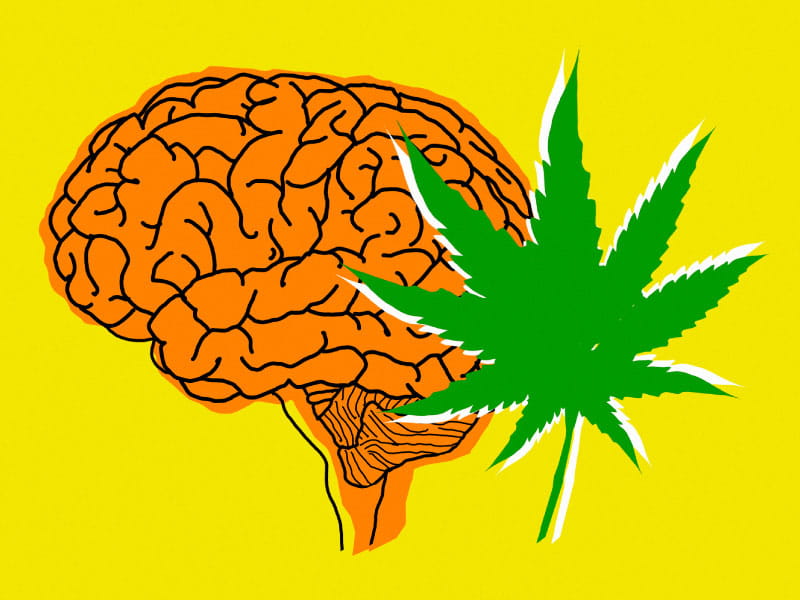
Medicinal and leisure use of marijuana has been rising, together with the drug’s efficiency, over the previous twenty years. However the way it might affect mind well being, notably throughout key intervals of growth and maturation, stays unclear, based on a brand new report.
The scientific statement from the American Coronary heart Affiliation, revealed Thursday in its journal Stroke, consists of an evaluation of present analysis and will inform scientific observe tips on the drug.
“There’s a number of uncertainty within the medical group concerning the well being results of marijuana. This scientific assertion is meant to information well being care professionals in having a balanced and intentional dialogue with sufferers concerning the potential identified and unknown results of marijuana on mind well being,” writing group chair and neurologist Dr. Fernando D. Testai stated in a information launch. He’s a professor of neurology and rehabilitation on the College of Illinois at Chicago.
In August 2020, the AHA revealed a statement on the affect of marijuana use on cardiovascular well being. That is its first assertion concerning the drug’s affect on mind well being. A rising variety of states have legalized or decriminalized it over the previous twenty years, and the usage of marijuana, also referred to as hashish, is on the rise within the U.S., particularly amongst adolescents and younger adults. Multiple-third of highschool seniors and 43% of faculty college students reported utilizing marijuana in 2018, based on the assertion.
The focus of THC – tetrahydrocannabinol, the psychoactive part in marijuana – additionally has been rising, from 4% in 1995 to fifteen% in 2018. THC is the compound that offers customers the feeling of being excessive. Whereas some states have legalized marijuana, it is nonetheless unlawful federally, with the U.S. Drug Enforcement Company and Meals and Drug Administration classifying it as a Schedule 1 managed substance.
The opposite main part of the marijuana plant, cannabidiol, abbreviated as CBD, has no psychoactive results and is authorized when its THC content material is lower than 0.3%. CBD, which has antioxidant and anti inflammatory properties, is being investigated in scientific trials for its potential for treating Alzheimer’s illness, a number of sclerosis and different neurological issues.
Extended publicity to THC can disrupt reminiscence, studying and mind growth, based on rodent research cited within the new scientific assertion. Throughout prenatal growth, THC can disrupt signaling pathways that alter the offspring’s considering, emotional conduct and response to emphasize. Throughout adolescence, THC might change the construction and performance of mind circuitry, affecting cognition, emotional regulation and social conduct.
The human physique naturally produces compounds known as endocannabinoids, that are important to mind growth and maturation and are concerned within the regulation of physique processes reminiscent of studying, reminiscence, ache management and sleep. THC can disrupt these processes by attaching to the identical neurons within the mind that endocannabinoids do.
“Information obtained in these animal research exhibit that disruption of endocannabinoid pathways results in behavioral and cognitive abnormalities, reminiscent of poorer reminiscence and studying skill and a heightened sensitivity to emphasize,” Testai stated. “Additionally, there could also be very important life intervals – gestation and adolescence – when the mind could also be notably weak to the affect of THC.”
Human research have had extra blended outcomes.
Research discovered psychological issues and difficulties with cognitive perform in youngsters whose moms used marijuana whereas pregnant. In a examine of younger adults who have been adopted for 25 years, additionally they discovered a correlation between extra years of self-reported publicity to marijuana and declining scores on verbal reminiscence assessments.
Some research additionally discovered a thinning of areas of the mind concerned in cognition and orchestrating ideas and actions, however different research discovered no variations within the brains of marijuana customers and non-users. In accordance with the assertion, analysis additionally exhibits hashish customers have an elevated threat of strokes.
Lastly, it highlighted the quite a few questions concerning hashish use that stay unanswered, reminiscent of whether or not its affect on mind well being varies based on the person’s age; the way it might work together with medicines; whether or not completely different THC ranges affect the mind in a different way; whether or not marijuana impacts folks in a different way once they smoke it versus consuming it in edible merchandise; and whether or not utilizing the drug medicinally versus recreationally impacts the mind in a different way.
“Our understanding of the consequences of marijuana on the mind is imperfect, and human analysis on this space is a piece in progress,” Testai stated. “Nonetheless, the outcomes of latest animal research problem the broadly accepted concept that cannabinoids are innocent and name for warning when utilizing marijuana, notably whereas pregnant or throughout adolescence.”
If in case you have questions or feedback about this story, please e-mail [email protected].
















